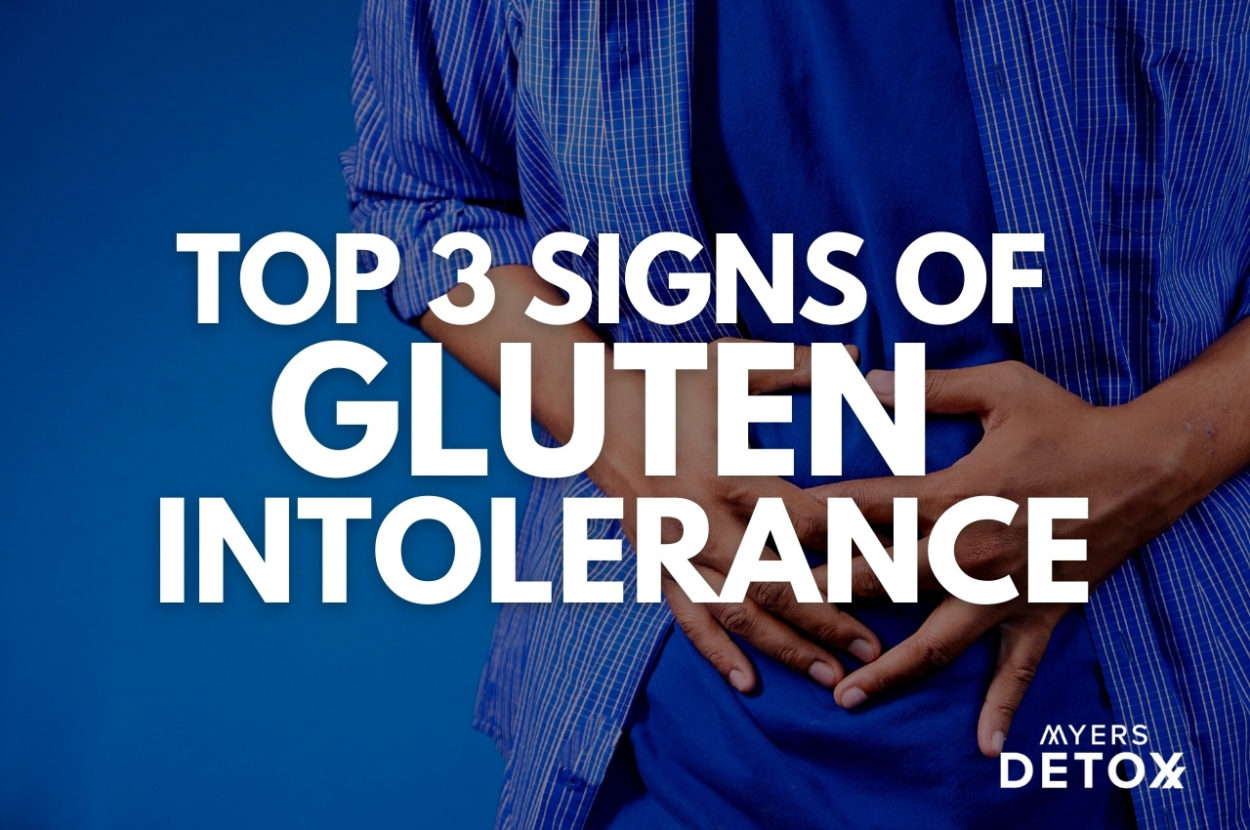It seems like the gluten-free diet is becoming more and more popular as you can now find everything from cookies to bagels to donuts in gluten-friendly varieties.
When the gluten-free craze began, many doubters insisted that “gluten-free dieting” was just another fad. However, today we’re seeing more and more people finding relief from a number of symptoms when they remove gluten from their diet. Studies are also showing that a gluten-free diet may be the key to a healthy gut, which correlates to the health of your entire body.
Should you be avoiding gluten? For many people, symptoms of gluten sensitivity show up outside of the gut. For instance, brain fog and skin issues are common side effects of consuming gluten when your body can’t break it down properly. On the other hand, many people claim that they handle gluten just fine, with no side effects to report.
In this article, we’ll discuss:
- What gluten intolerance is, and how it impacts your body
- The surprising role that liver health plays in gluten intolerance
- The top three signs and symptoms to watch out for if you’re gluten-sensitive
- How to manage gluten intolerance and optimize your ability to mitigate the impact of gluten
What Is Gluten Intolerance And Why Does it Occur?

Gluten intolerance occurs when your body is unable to properly process and digest the protein gluten, which is found in grains such as wheat, spelt, barley, and rye.
The most serious form of gluten intolerance is celiac disease, which is an autoimmune disorder that damages your intestinal lining and causes severe inflammation in your gut[1].
While celiac disease is becoming more common, non-celiac gluten sensitivity and wheat allergies are rising at an even greater rate.
Why exactly is gluten intolerance on the rise? There are many theories, although no one has been able to nail down the exact mechanism as of yet.
What many people believe, however, is that the toxins in our environment, along with the genetic modification of wheat, are making it hard for people to break down the gluten protein.
As a protein, gluten is highly resistant to the biochemical process called hydrolysis. Hydrolysis is the addition of water to a compound, which helps to break down the compound into smaller parts and is a crucial aspect of digestion. When gluten is not fully broken down it can enter your circulation and create an immune response.
Just as your immune system would become alerted to any other type of compound (bacteria, virus, etc) that it didn’t recognize, partially broken down proteins set off the alarms of your immune system that something isn’t right[2].
As a result, many people with gluten intolerance experience inflammation not only in their gut but systematically. This is why many people with undiagnosed gluten intolerance may experience joint pain[3].
To make matters worse, inflammation in your gut can lead to something called intestinal permeability, also known as “leaky gut.” In leaky gut, your intestinal lining becomes weak, allowing in larger compounds that would typically be too big to pass through your intestinal wall. This further ramps up your immune response and can lead to more serious issues like autoimmunity[4].
The Liver Connection
What many people overlook in gluten intolerance is the connection to liver health. A healthy liver is necessary for calming inflammatory responses in your body, as well as mediating the immune response that food sensitivities and allergies instigate. When your liver is weak, it can set the stage for worsening inflammation and immune responses[5].
Furthermore, it appears that one of the organs most impacted by celiac disease and gluten sensitivity is the liver. This means that for someone with gluten intolerance, their liver isn’t able to work optimally to calm the inflammatory reaction in their gut and control the body’s allergic response via the immune system. As a result, an endless cycle of inflammation, immune activation, and liver damage may ensue[6].
Top 3 Warning Signs of Gluten Intolerance
Gluten intolerance can come with a host of symptoms, many having nothing to do with digestion. People may experience anything from skin rashes to mood disorders to physical pain. Before gluten intolerance turns into conditions like autoimmunity and systemic pain, you will likely experience a handful of signs that your body is not digesting gluten.
The top three warning signs of gluten intolerance that you should never ignore include:
#1 Digestive Disturbance
Due to the impact that gluten can have on the digestive tract of people that are intolerant, one of the most common signs of gluten intolerance is digestive disturbance.
Inflammation in the gut can throw off your gut bacteria and create a range of uncomfortable symptoms such as diarrhea, constipation, abdominal pain, and bloating[7].
Digestive discomfort will happen within hours of consuming gluten and can vary between constipation or diarrhea for most people. In more severe cases, this can even lead to nausea and vomiting. These symptoms may only last hours but can go on for days after consuming gluten[8].
Although having digestive disturbance, in general, doesn’t indicate gluten intolerance, if you notice that your symptoms come on soon after consuming gluten, then that is a sign that gluten is the culprit.
#2 Depression and Anxiety
By now, you’re probably familiar with the concept of the gut-brain connection. Due to the interplay of microbes and messengers in your gut signaling to your brain and vice versa, these two organs have a strong connection. Therefore, when your digestive system is out of balance, it can often instigate mental and emotional symptoms.
When it comes to gluten intolerance, research shows that mood imbalances such as depression and anxiety can be a signal that something is off in your gut. A growing body of evidence shows that for many people, mood disorders tend to resolve rapidly after eliminating gluten from their diet[9].
For people with celiac disease, depression and anxiety are particularly common, underlining the clear connection between gluten intolerance and emotional imbalances[10].
Other research shows that in addition to depression and anxiety, brain fog may also be directly tied to gluten intolerance, which is a very common issue for people today[11].
Exactly how gluten intolerance impacts the nervous system is yet to be understood, but one theory suggests that the imbalance in gut microbiota caused by inflammation in the gut is a key factor. When your gut microbiome is disturbed, it can create the conditions for the growth of harmful bacteria, which in turn impact the nervous system and increase the risk for mood disorders[12][13].
#3 Skin Problems
Along with emotional imbalances, gluten sensitivity can also show up on your skin, even when no digestive issues are present.
Many people with gluten intolerance report skin issues such as dermatitis herpetiformis, a blistering skin condition that’s related to immune reactions. Luckily, a gluten-free diet typically clears the skin, reducing the inflammation and rash instigated by gluten sensitivity[14].
Research also suggests that skin conditions such as psoriasis may be related to gluten sensitivity, as a gluten-free diet tends to calm psoriasis inflammation[15].
Another skin condition, called chronic urticaria, may also have ties to gluten sensitivities, as several case reports have found a link[16].
Generally speaking, what all of these skin conditions have in common is inflammation. Therefore, it’s possible that the systemic effect of inflammation caused by gluten could be showing up on the skin as an outer signal that inflammatory chemicals are high within the body.
How To Manage Gluten Intolerance
For anyone that is sensitive or intolerant to gluten, the first thing you must do is remove gluten-containing foods from your diet. If you want to give your gut a chance to heal, you cannot keep introducing gluten into your diet, as this will only keep the inflammatory response active.
In addition to removing gluten, however, there are steps that you can take to help bring your body back into balance. The key to managing gluten intolerance is mitigating inflammatory processes that set the stage for leaky gut and improper immune activation.
Once gluten is out of your body, you can begin to strengthen your immunity by promoting liver health. A healthy liver will not only keep your immune system balanced, but it will also help to decrease the inflammation brought on by gluten.
Furthermore, the inflammation present in your gut will take more TLC than removing gluten to resolve. This is where anti-inflammatory herbs can make a significant difference. Natural compounds from plants like turmeric, ginger, moringa, and acai can help to calm the inflammation in your gut and systemically and bring your body back into balance[17][18][19][20].
For anyone struggling with gluten intolerance, I recommend adding a nutrient-dense supplement like Daily Detox to their diet. Daily Detox not only supports liver health through a variety of medicinal plants, but it also has a blend of immunity-boosting mushrooms along with a host of anti-inflammatory superfoods.*
Together, the nutrients in Daily Detox assist in liver, immunity, and a healthy inflammatory response – hitting the symptoms of gluten intolerance from all angles.
Takeaway
Gluten intolerance is only growing in its prevalence, and many people are unknowingly consuming wheat and gluten products when their body isn’t set up for it.
If you’ve been struggling with digestive issues, emotional and mood problems, or inflammatory skin conditions, it’s time to take a look at your diet and assess if gluten could be the problem.
Step one is eliminating gluten from your diet, but step two must include liver and inflammation support. If you’ve been consuming gluten for years, you can be sure that your body has high levels of inflammation that must be calmed before you can return to optimal health.
*Disclaimer: These statements have not been reviewed by the FDA. Daily Detox is a dietary supplement that is not intended to diagnose, treat, cure, or prevent any disease. Please talk to your doctor before beginning any new supplement regimen.











